#where are the citations
Text
Death of the Author by Ronald Barthes (1967)
Full disclosure, I've never really liked this essay. That said, I do like Barthes' other arguments. But I always found this one lacking, not in its central thesis that readers also matter, but I find that the lines of evidence are really poor. People worship this argument far too much without examination of why it has no citations and no one seems to be willing to question the argument in full from other viewpoints of things like, does it make philosophical sense?
But then people often use this essay as a crutch to say they don't need authorcism, and in fact go towards 100% readercism and then skip out on other critical theories. This isn't exactly what it argues, but I also feel like it doesn't argue the points it wants to make well. And truly, if I handed something like this in as an undergrad to my English classes, I'd be marked down hard. I think we need the same level of scrutiny towards the so-called masters as we do towards students and don't make excuses for "Because he's well-liked". This wasn't a new idea like he suggests. Authorcism goes further back than he suggests–but because people don't want to challenge these notions (and apparently don't read all the way through Poetics?) they think he's brilliant?
Dude gave no citations. Seriously. All his assertions are on weak ground.
Man, sometimes I think being born a white straight male means never being questioned when you make wild assertions and no one will ever fact check you ever. Well, I'm fact checking this thing, and it's not coming up the way he wants.
Original file: (translated, 1977)

No one wants to say this is racist or challenge the whole, "In ethnographic societies the responsibility for a narrative is never assumed by a person, but by a mediator, shaman or realtor whose 'performance' the mastery of the narrative code–may possibly be admired but never his 'genius'."
The core idea that the "author" is a modern figure is disputed by Aristotle, when Aristotle goes on and on and on about how much of a effing genius Sophocles was. I mean that Homer dude, that Homer dude wasn't good for anything and is a distant second to Sophocles. (Why do I remember this? Because I read the whole of Poetics and *cough* Aristotle waxes on poetic about Sophocles and barely mentions anyone else.)
No one wants to challenge how this basis and core of his thesis is coming off racist?
It's reading as those "primitive" people in that effing functionalist snobbery where some civilizations are "more advanced" than others storytellers aren't lauded. Ummm... OK, prove it, buddy. Your anthropology is faulty.
Often shaman, the keepers of the stories of the tribe/organization are lauded in their communities as important. If this was NOT true, the British Empire wouldn't have specifically gone after and tried to KILL those people. If he's arguing that the author was less important in those stories, that those people said, which is an interpretation, because he's not directly saying it, then the problem with that is there is a difference between losing the author, and what we'd call resonance of the words. And then you have a whole semantics question here on how much do stories outlive their authors, and how much there is over attribution issues to people that should not be lauded.
And then that's a whole other question than authorcism v. readercism. Because even those stories without the original author who might have shifted over time, still have other ways to read the text. Those are historicism, cultural relativism, race theory, etc. All of which, BTW, did exist by the time Barthes was writing. To pin his hopes on readercism, and say something this effing racist, that copyright does not matter to tribes, without textual evidence, when Kung! do respect copyright ideas, at the very least, is trying to kill the author, but also bury everything else in literary discourse, which was an issue I had with Percy Lubbock, to be fair, because I thought his way of thinking was far too reductive.
There's no citation?
The explanation of a work is always sought in the man or woman
who produced it, as if it were always in the end, through the
more or less transparent allegory of the fiction, the voice of
a single·person, the author 'confiding' in us.
I disagree, it's an overstatement at this point in time. Selden Lincoln Whitcomb, did do some of this, but he also looked at other things to explain the text. And there was Percy Lubbock who introduced Readercism (not the coinage, but the concept) in 1921. (yes, 1921, eat it, it sounds like plagiarism....). The absolutist idea that it was always sought through the author before this point isn't true. 'cause I effing did my reading.
Percy Lubbock said it was ultimately up to the reader to know the context, etc. Earlier critics have also suggested things like partnership between audience and creators. This would be writers such as Bertolt Brecht, who was around by the time Barthes was writing and gets half-hearted cited, no less. TT I did a ton of reading. There was a ton of effort in the early 19th century to give more context to plays like Antigone. Even that jerk, Freytag tried to give context to Aristotle, though wrongly. He uses (wrong) Historcism in order to illuminate Aristotle.
Though the sway of the Author remains powerful (the
new criticism has often done no more than consolidate it)
What? As I outlined, I don't see that. He's making assertions without citation. And then people aren't challenging it. Why? I would be 100% be required to give citations for either assertion.
In France, Mallarme was doubtless the first to see and to foresee in its full extent the necessity to substitute language itself for the person who until then had been supposed to be its owner. For him, for us too, it is language which speaks, not the author; to write is, through a prerequisite impersonality (not at all to be confused with the castrating objectivity of the realist novelist), to reach that point where only language acts, 'performs', and not 'me'. Mallarme~s entire poetics consists in suppressing the author in the interests of writing (which is, as will be seen, to restore the place of the reader).
Stéphane Mallarmé was born 1842. No citation of the essay. TT Again, I'd be required to cite the effing essay. No one wants to challenge this? Intertextual evidence is missing. For a guy who says the reader is most important, he isn't doing a lot to prove it in his own work.
Instead, Barthes gets lauded by later writers by interpreting what the author meant when the author didn't say it?
It was largely by learning the lesson of Mallarmé that critics like Roland Barthes came to speak of 'the death of the author' in the making of literature. Rather than seeing the text as the emanation of an individual author's intentions, structuralists and deconstructors followed the paths and patterns of the linguistic signifier, paying new attention to syntax, spacing, intertextuality, sound, semantics, etymology, and even individual letters. The theoretical styles of Jacques Derrida, Julia Kristeva, Maurice Blanchot, and especially Jacques Lacan also owe a great deal to Mallarmé's 'critical poem."
--Barbara Johnson, "Translator's Note" to Stéphane Mallarmé, Divagations, trans. Johnson, Cambridge, MA: Harvard University Press, 2007, pg. 301.
Isn't this against what he's arguing for? He didn't leave it on the page. He didn't say any of this. Barthes left no evidence. Reader with no context wins?
To be fair, here, I've seen Barthes other work and he does know how to do citations, but Johnson is flat out trying to explain the author for him and I don't like that. If you're arguing for readercism, then the author's intentions shouldn't need to be explained.
By putting it behind a veil of "Well, he did no citations, so we need to interpret what he meant" when he doesn't leave it on the page, that's authorcism, ironically. Makes me cranky when white men get away with doing no citations to prove their thesis.
Barthes cites Valery is Paul Valéry b. 1871, also no citation. I'd get lambasted if I did this. Ah, white male privilege.
No intertextual evidence for his assertion here, either. While I don't love Lubbock 100% and I thought he oversimplified, at least he put *effing citations* on the page to prove his assertions.
Where are the citations? He doesn't need them? Why?
Proust gave modern writing its epic.
There's no proof for this assertion. I don't think it's true either. Epic of Gigamesh. It was translated in 1875, not by Proust. Barthes knew about it. He's not giving the context well in the text either.
There's no citation for his assertions of Proust either. He makes opinions, but where is the textual evidence?
The removal of the Author (one could talk here with·Brecht of a veritable 'distancing', the Author diminishing like a figurine at the far end of the literary stage)
He cites Brecht, not the particular work?? But also Brecht argued for partnership between audience and author a bit at least?
Urrrgghhhh I HATE writers like this. Have I not gone over how much I dislike people who do assertions without citation and then get lauded?
The Author, when believed in, is always conceived of as" the
past of his own book: book and author stand automatically "
on a single line' divided into a before and an after. The
Author is thought to nourish the book, which is to say that
he exists before it, thinks, suffers, lives for it, is in the same
relation of antecedence to his work as a father to his child.
Barthes, citation? No citation?
You asserted it was a "New idea" that the author reigned supreme. Prove it. Show the work that says that. Because Aristotle, nope. Aristotle worshiped the living pants off of Sophocles.
Look, Lubbock did a better job supporting his assertions in this area. He actually cited living works and did intertextual evidence. I agreed that his assertions are reductive like Virginia Woolf, but at least the man cited Tolstoy. He didn't make wild assertions about Tolstoy and then hoped that someone would get the references, and then cite no works.
In complete contrast, the modern scriptor is born simultaneously with the text, is in no way equipped with a being preceding or exceeding the writing, is not the subject with the book as predicate; there is no other time than that of the enunciation and every text IS eternally written here and now.
Modern from when? What time period? If you're trying to argue anyone before Stéphane Mallarmé existed, again, effing Poetics. Not to effing mention the whole of Aelius Donatus's entire treaties on how plays should go was based on a single author: Terence. In what time period are you talking about? Author worship goes way back in time. Effing reading about Aelius Donatus loving the hell out of Terence's play with r*** made me cranky for a week. He found it sooo funny. And I was struggling with the Latin too.
The fact is (or, it·follows) that writing can no longer designate an operation of recording, notation, representation,
'depiction' (as the Classics would say)
which ones, Barthes, which ones? Give me an effing citation. 'cause I can't see that the "depiction" reigned supreme over the "author" through Aristotle literally ranking Sophocles as better than Homer. Aristotle kept going on and on about it. Plus you just cited Brecht earlier, who hates Aristotle's ass. So, make it mesh together. Which parts of the "Classics" are you citing, and which parts of Brecht are you taking from? Brecht HATES Aristotle, and most of the time when people talk of Classics, they are talking about Greek plays. You need to delineate which parts you are taking and which you leave behind.
rather, it designates exactly what linguists, referring to Oxford philosophy, call a performative, a rare verbal form (exclusively given in the first person and in the present tense) in which the enunciation has no other content (contains no other proposition) than the act by which it is uttered - something like the I declare of kings or the I sing of very ancient poets.
No citation again. I'm cranky. No citation or quotes for all these pages. For an author whose supposedly arguing for "readercism" and "simplicity" by leaving it on the page, as the critic earlier, Johnson, is saying, he's not doing either, honestly.
Having buried the Author, the modern scriptor can thus no longer
believe, as according to the pathetic view of his predecessors,
that this hand is too slow for his thought or passion and that
consequently, making a law of necessity, he must emphasize
this delay and indefinitely 'polish' his form. For him, on
the contrary, the hand, cut off from any voice, borne by a
pure gesture of inscription (and not of expression), traces a
field without origin - or which, at least, has no other origin
than language itself, language which ceaselessly calls into
question all origins.
Honestly, there is more burying of citations.
He's saying in the fanciest of words to make it sound like he's smarter than he is, that "You aren't dumb 'cause you don't understand the author." If he's arguing for simplicity and leaving on the page, he's not practicing the same himself. So I don't know if the earlier argument by Johnson works in his favor at all.
We know now that a text is not a line of words releasing
a single 'theological' meaning (the 'message' of the Author God) but a multi-dimensional space in which a variety of
writings, none' of them original, blend and clash. The text
is a tissue of quotations drawn from the innumerable centres
of culture. Similar to Bouvard and Pecuchet, those eternal
copyists, at once sublime and comic and whose profound
ridiculousness indicates precisely the truth of writing,
the writer can only imitate a gesture that is always anterior,
never original.
I have issues with this from a philosophical PoV.
The question of originality, is certainly something that rose with industrialization, but that's more of an individualism, rather than an authorcism, I would argue–given how much that Aristotle, Aelius Donatus and others around the world tried very hard to preserve authorship. An argument of lost authorship overtime is a totally different affair, and one I've been dealing with as people over attribute, and I find that quotes are wrongly attributed because people don't remember the author or are too lazy to look up the texts they are talking about (I'm staring at you Barthes).
Individualism, is well, well argued to have risen with industrialization. Off the top of my head, though not in Barthes' time, you have Lucy Worsley, who in A Very British Romance argued that individualism in Romance is a very modern notion (argued, first episode within the first few minutes). Not to mention a lot of social sciences, in general, argue for this type of individualism, and then that argument, in general, leading to the arguments for why industrialization often leads to loneliness. To be contextually fair to Barthes, he didn't have the bit about loneliness yet, since that's a more recent sort of studying, but the scholarship on individualism as a part of industrialization should have been emerging in his time period, IIRC. This might have spurred this essay, but the notion that historicism and other ways of examining the text along with the author did not exist is a farce, at best.
One could argue the Butterfly effect, which is Henri Poincaré, prior to Barthes' existence of his essay, would disprove the idea of originality, but we're getting neck deep into physics and philosophy here. I am a nerd and interdisciplinary, so...
Say huip is a new thingy. It weighs 200 lbs. It does a bunch of new stuff–very theoretical. It doesn't matter. Someone newly buys this object that can do new stuff. It is a result of culture. Yes? Interwoven culture, as Barthes describes.
Bob has bought this huip thingy, and drops it down some stairs and finds that it rolls, not doing the original intended function. This is his particular life experience with huip. He thinks that 200lbs being able to bounce down stairs is awesome. I mean, dude, it defies all physics and is able to go down and turn on stair landings.
Bob posts this information somewhere, puts it into text, and then his interpretation, is by writing it, it is fun.
Sally, say, does the same thing, but kills a cat.
The first ripple is that it has killed a cat. Oh no, Sally's interpretation of huip is that the cat is dead and she's getting sued.
Isn't Sally's interpretation of huip and this thing it can do, but wasn't designed for novel as Bob's interpretation? If they both post about it, they are authors of a new experience.
If the manufacturers of huip say, but Huip isn't supposed to do that and do a total recall of the product and start doing things like making it so it can't roll, or weigh that amount, then the experience of the object changes. A new novel experience happens.
So the philosophical question is "What is then new?" in this scenario. If Barthes says "nothing" then it becomes an issue. Because humans aren't the same over time. And if you say that the author, Bob of the huip meme, didn't have a novel experience, dude, it is 200 lbs of menace and he discovered something new.
The fact that Sally interpreted it and then it ran over the cat and killed it... who is liable in that scenario? Bob, who didn't follow the instructions and accidentally found out and memed out what huip can do, the manufacturer, or Sally or all three?
Something clearly new happened.
BTW, I randomly pressed letters to come up with said object, huip.
If the experience is always anterior and not original, then how come witnesses never agree on anything? I don't think Barthes thought this part through completely. It's missing some key French Philosophers.
His only power is to mix writings, to counter the ones with the others, in such a way as never to rest on anyone of them.
Writers go outside and do things like experience seeing a new animal. Saying that a writer only mixes previous writing and cultural functions... meh, I'm not quite sure about this.
If his total argument is culture shapes the writer, and the writer has no free will, and the writer is merely mixing other writers, thus there is nothing new, this is more like an argument for determinism over free will, which runs into philosophical problems as I illustrated with Bob up there. Bob had a novel experience he wrote about. It wasn't the intention of the manufacturer, but gravity is not manufactured by culture. Stairs are manufactured by culture. Did an accident with gravity and a manufacturing error shape Bob into writing and memeing what he did with the huip? Or was it really Sir Issac Newton whom Bob never bothered to read, but loosely heard about once in Science Class for a test and he can't bother to remember the numbers for gravity.
Writers have experiences outside of books. The filter might be culture, but the filter doesn't always shape everyone's opinion exactly the same. Perspective, worldviews, and experiences do, and that's what's novel.
Barthes further argues that because the author has a dictionary, they are caught in culture. Urrggg. I made up huip on the spot. You still have no idea what the primary function of the object is. I'm sure someone is trying to make up one in their head. Or I typed that up and someone is making it up. But I don't particularly need to know much in order to make up that context. I need stairs, some name, and a mythical object I banged my keyboard for. Gravity is a natural force I personally experience. Especially when I was struggling to put an air conditioner in my window, heard a cat and then wondered what would happen if said air conditioner landed on the cat and then posted about it on Nanowrimo in 2008-ish.
Barthes might argue that I got it from literature somewhere. But the filter of words had nothing to do with the initial experience. I didn't have to put it into words. No one else was there.
Where did I get 200 lbs? Uhhh... random number.
Where did I get the runs over cat–from the original experience of worrying about the air conditioner falling from the window.
Where did I get magically rolls down stairs? I had an experience with a friend of mine that liked to roll down stairs. It was a novel experience for me. She liked to bounce around corners. (Hello, Libbie).
If writing is purely words, culture, not nature, experience, worldview, opinion, Barthes has an issue with the treaties here.
My novel experience with the air conditioner and feeling like a weakling and hearing a cat though cat is not a controllable object in my framework, lead me to post about air conditioner falling from my apartment window into a roof, killing a cat, and typing it into Nanowrimo's boards.
Is Barthes saying the entire incident is mediated purely by words? That's a lot of coincidences, don'tcha think?
Gravity isn't a cultural experience and not everyone thinks in words either. In order to write you have to use words, certainly, but the initial experience still is not necessarily mediated by words or culture as he'd expect.
Classic criticism has never paid any attention to the reader;
for it, the writer is the only person in literature. We are
now beginning to let ourselves be fooled no longer by the
arrogant antiphrastical recriminations of good society in
favour of the·very thing it sets aside, ignores, smothers, or
destroys; we know that to give writing its future, it is
necessary to overthrow the myth: the birth of the reader
must be at the cost of the death of the Author.
Untrue. Aristotle spends a HUGE amount of time on it. HUGE. !@#$. (We need the play to have negative reinforcement on the reader in a morality PoV–he spends a lot of his treaties on this. How do you achieve this as author. About how the audience should feel. How plays are inferior if they don't achieve this. About how Homer was a poor writer for not doing it correctly and the impact being wrong.) Aelius Donatus even talks about it. (We Latins this. We Latins that. What does the audience think. What's the difference between 'us' Latins and the Greeks? Should we account for the differences?)
His idea is that in the past authors were never worshiped, until the "modern era" and copyright didn't matter. (Untrue, Aristotle). And that the reader has forever been ignored in literary criticism before him. (Brecht, Aristotle, Aelius Donatus?)
We should ignore the author because the reader is the ultimate decider–honestly Percy Lubbock did a better job arguing this in 1921 with less convoluted language.
That everything is mediated by culture for the author and previous texts. (Didn't read Raw and the Cooked by Claude Levi-Strauss? Levi-Strauss, BTW, was French and published before him) And that copyright didn't exist in those all oral tradition tribes. TT Kung! Anyone?
Because you see, according to him, writers don't experience or mediate it through their own lives. Only through texts.
I think the better argument for readercism would follow like this:
Readers have their own experiences and worldviews. This will not be universal or resonate reader to reader because inherently no two people will agree on anything. Despite that there is a sort of cultural agreement to tame what seems like chaos. Writing comes into this chaos and tries to pull meaning from it.
The writer and reader's experience will not close to always match, so the impact of the writing is not going to be the same no matter what you will do. The best you can do is mediate your experiences, whether it's with culture, nature or your personal experiences through writing which is interpreted by others.
As Lubbock said, the text doesn't come alive until a reader reads the text.
To me, Barthes' argument is far, far more poor than Lubbock's argument for the same. At least Lubbock's argument for the same wasn't effing blatantly racist. (I give more leeway to Lubbock in 1921, before the 1960's than Barthes in 1965 who is also French and has clearly access to Levi-Strauss and even talks about ethnographies) It's based on assumptions, the majority of which aren't backed up. Plus he has more to work with if what he says is true. D- argument. He doesn't argue for what to replace it with, doesn't talk about the other critical theories at all. Urgghh. He's done better. But I know, I'm not supposed to question the greats when people worship them. But it irks me that he gives one citation, maybe, and then we blindly believe everything else he wrote. Why? I want some critical thinking here.
For the record, I hated Derrida too. His major flaw for me, BTW, was that he said everything is mediated through words, which is not true. Functionalists suck. Structuralists suck less, but are still effing prone to racism.
Sometimes I wonder if academics purposefully like to teach convoluted texts like this without citations, rather than a cautionary tale, of what will happen, but because it sounds smart and convoluted and because they don't check the assertions as true or not and plus there is a bonus points for the level of racism they can force their students to read, but they gloss over it and say ignore it. I mean, you absolutely need to read Emmanuel Kant, even if you can't with his hatred of women and you're supposed to ignore that part because there are no substitutes in the world that might have said the same things he said better. Urrgghh. Do you purposefully choose the most uptight racist white men to teach and tell that they are lauded? Lubbock made a far, far better argument. Lack of citations and blind worship because of lack of citations+white maleness makes me cranky.
#critical theory#story theory#roland barthes#writing#death of the author#where are the citations#white male privilege#white male privilege says you don't have to cite anything and still get believed? Bullshit#Evidence is poor
5 notes
·
View notes
Text
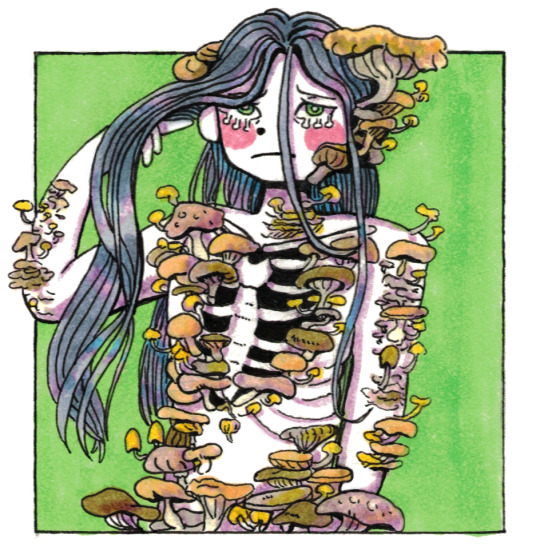
Mushroom body
(for @mikkeneko)
#SVSSS#shen qingqiu#mushrooms#body horror#better drawn mdzs#<-tag for higher effort art. At times like this I really wish I chose something else.#What is an October raffle for if not to end off with a little mushroomy body horror?#This one is inspired by my massive disappointment upon discovering that sqq's 'mushroom body' was just....guy shaped.#Come ON where is the fun in that? Why are we being kept from Fungi Amalgamation Monster Loving?#It's not going to stop Luo Binghe! SQQ could be a shapeless lump of slime and LBH and would still be over the moon for him.#Thank you *so* much for the prompt! I had so much fun. I love mushrooms and doing research was a delight! My citation list is long!#Broke my style a bit but I think it was a good choice. I have been trying to practice non-dot eyes more and its slowly coming along!#Also huge congrats mikkeneko for winning Twice In A Row!!#Your odds were a little over 1 in 1000! Lucky you!
760 notes
·
View notes
Text

so. my laptop is Deceased, which means I don’t have half of my pdf library (because I wasn’t able to back it all up yet. weeping and wailing), and THAT means that I have a much smaller pool of texts to work off with and cite, so. this is a much more direct glimpse into my thoughts when I’m reading ancient sources and don’t have the poetry of scholars to direct my imagination
anyway, the tris homines alliance is also an informal club for people that had weird but formative relationships with sulla. like. a real Make Them Worse situation happened there. crassus becomes someone who is half shadowy rumor behind every dealing in the eyes of others, pompey and caesar drag rome back into civil war, sulla says that caesar resembles marius but it’s sulla’s playbook that caesar later runs. everyone dies in places where they do not expect to die.
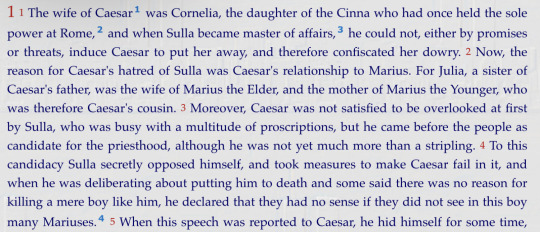
Plutarch, Caesar


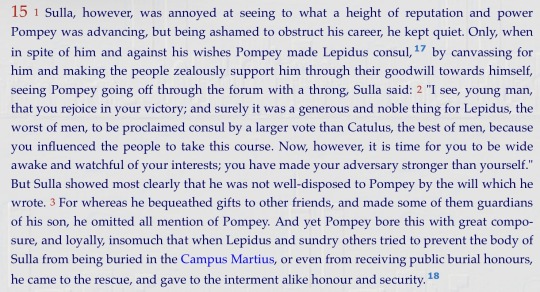
Plutarch, Pompey

Plutarch, Crassus
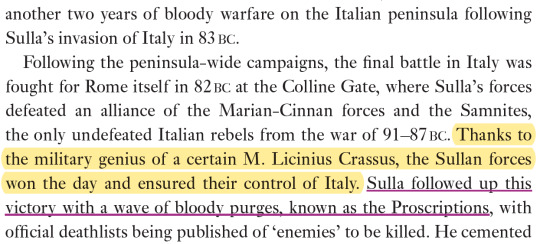
Rome, Blood & Power, Gareth C Sampson

Sulla: The Last Republican, Arthur Keaveney
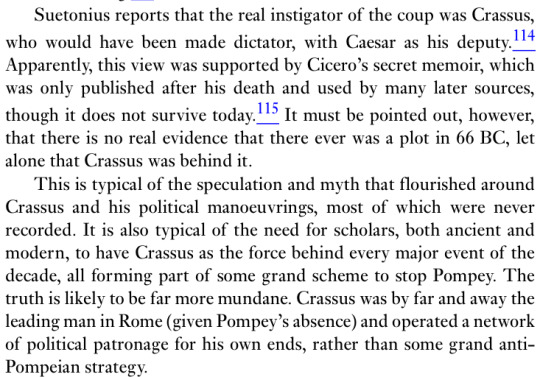
The Defeat of Rome: Crassus, Carrhae and the Invasion of the East, Gareth C. Sampson
#I’m doing all of this on my iPad and I’m fucking dying#I’m like. I’m OLD I only use my iPad for art and work. Typing all of this out on a touch screen took out my lifespan#tris homines#roman republic tag#everyone clap for caesar#komiks tag#Can’t wait to do the comic where caesar has Crassus’ fingers in his mouth bc that has no citations. maybe one.#gotta. Pick myself up off the ground. I have spent enough time crying over lost PDFs. I will probably cry more.#but these three absolute nightmares are calling my name and I will heed the call. I can ALSO make them worse#shaking hands with sulla on that and on that ONLY#drawing tag#gnaeus pompeius magnus#marcus licinius crassus#gaius julius caesar
520 notes
·
View notes
Text
Tw for weight loss mention
The whole exercise will cure your disability thing is a fucking joke. Yes exercise is beneficial for your health, but only if you aren't already on shaky foundations. You need to be on a treatment plan that WORKS before going into the maintenance phase. You wouldn't do regular maintenance on a broken item, you'd work on getting it up and running first. And maybe it would even need specialized maintenance afterwards if it's especially fragile.
I have fibromyalgia and acute degenerative disc disease. My immune system attacks my nerves and discs in my spine are slowly calcifying and causing the bones to constrict and damage my nerves (i think thats how it works). I have days where it feels like my body is on fire from nerve pain and days where it feels like my spine is about to rip from my back. And days where I have both (like today!). I get numbness in my hands and feet. I have horrible migraines. I can no longer walk unaided more than maybe 5 minutes without severe pain. I have something wrong with my knees and hips but the doctors don't know what yet.
You'd think I live an obviously seditary lifestyle correct?
Hell no.
I walk aided on average 6 miles a day over difficult terrain OUTSIDE of regular activity almost everyday. My legs are muscular and strong. I get my heart rate up and a good sweat, like all the gym rats swear on. I am often doing physical labor such as weeding, digging, sample collecting, pruning trees etc.
I'm not saying this to make other disabled people feel bad or prove that they can do anything if they just tried harder. This is an extremely painful lifestyle I've chosen that takes a lot of lifestyle management AND BOUNDARIES to keep up with the work. I also have an extremely forgiving boss who is also physically disabled and knows what I'm going through (deciding between your passion and your health and having to do so each and every day) No one should ever be expected to do what I do. I'm not even sure if I should be doing this myself.
This is to prove that exercise? Has not cured me. My muscles are strong but still hurt as if they're broken and I have to take more breaks than my coworker. I am constantly getting out of breath and I flare up regularly if I'm not careful. I am in excellent physical condition outside of my disabilities. I go to different doctors several times a month to get checked out.
I previously went through a diet program and lost a lot of weight (basically starving myself and got off my depression meds which cause weight gain but are also the only ones that work) and guess what? That didn't do shit either!!! I still felt horrible!!! I've since gained back the weight anyway after switching to focusing on adding more nutrient dense foods than taking stuff away from my diet (also muscle weighs more than fat, and fat helps cushion my aching joints and spine).
The muscle doesn't do shit for my disabilities outside of maybe some stability. Exercising everyday doesn't make the pain go away. Without my medications and aids and nutrition plans and steroid injections and spinal adjustments and physical therapy (that takes my fibro and spine into account) and alternative work methods I WOULD NOT BE ABLE TO DO WHAT I DO. Exercise alone is like trying to make a car run with no oil. Yes it'll go but it'll get more and more damaged till it can't and will need its entire engine replaced!
And yet I see new doctors and they look at me and the first thing out of their mouths is do I exercise? I should try doing a little every day :) and then i fucking blow their minds when I tell them about my job. No longer can they use that fucking cop out on me. I've been through this rodeo. Ive tried their suggestions. If you are in pain and nothing is helping? Exercise ain't going to do SHIT. You need to get to a point where you can move without severe pain first (if that's even possible). Then and only then should you consider implementing regular exercise if you can. Also weight loss talk is a red flag and a cop out. They made me lose 50+ lbs before they would look into the reasons behind my pain. Weight loss did nothing for me and exacerbated my pain.
I am living proof that all that shit is a lie and a cop out. That is the point of this post. I cannot believe people with serious medical conditions are being forced to put their bodies through extreme duress just to be believed. You are not disabled because of laziness or because you sit a lot. Plenty of people live seditary lifestyles and do not live in constant excruciating pain (they may develop disabilities later in life due to this however, and should be doing preventative exercises to maintain their health)
Please, share my story with doctors. Use me as an example. I am proof that "exercise first treat later" does not work. I should not have had to wait years to have my pain validated. I'd rather hundreds of fakers get (what? A blood test? An MRI?) than one chronically ill person get told to try yoga and go away by a doctor.
#wrenfea.exe#doctors and nurses dont fucking clown on this post#anything you say needs to be backed up by sources with apa citation thrown in for good measure#this is my personal experience dont tell me im exaggerating or just havent tried hard enough#i will kick you with my horse legs and then go lie down for 4 hours#bedbound people i am sending you so much love and will probably be joining you in a few years#chronic disability#chronic pain#spoonie#fibromyalgia#disability#chronic illness#from the field#physically disabled#this also applies to neurodivergent and mentally ill people but pls don't derail#this is mainly about physical disabilities#you are welcome to make your own post and reference mine if you want @ me and ill reblog it#sometimes im like oh i cant be disabled bc i do all this stuff im a faker inflatrating the community#and then i have days like today where i cannot leave my bed#i am so pissed off that people with long covid and ME have to go through that fucking exercise rehabilitation program#that actively makes their mitochondria worse#you wouldnt start using a vase without fixing the cracks first#the water will spill out and the flower will die#degenerative disc disease
56 notes
·
View notes
Note
What are your ryomina headcanons? I've loved these two since I played P3 FES, and I'm so excited to get back into the fandom^^
hi!! thank you so much for the ask, welcome back to the p3 fandom, it's always a delight to see new and old ryomina fans alike! 🥺💛💙
as for headcanons, here's a "few" i that i tend to come back to a lot! my interpretations of them are influenced from both the source material and other's fanworks, so i've linked to them as i saw fit! hcs in no particular order under the cut because oops this got long (900 word bullet point list, mentions of reload content up to 1/1)
minato's hair is dyed blue (hair originally brown, you can see it in his roots!) and he has a beauty mark on under his left eye. i like mirror imagery and there's definitely a few arts i've rb'd that portray them this way :) (e.g. this one by feliichu and this one by marasschino)
as far as i'm concerned the bathhouse scene from the manga where ryoji's hair down = similar shape to minato? that is canon to me. this art from xierru is a fun depiction of hair down ryoji :D
ryoji is homeless. everyone say thank you foxmulder_whereartthou for this awesome fic it's why i have the headcanon! but like seriously. we have no idea where ryoji lives and i could believe this.
minato dying at the end of the game is sad to an outsider's POV BUT!!! ryomina gets to be together in death for the rest of their lives (this illustration from mafuwara is a gorgeous representation of them as nyx avatar + the seal)!
speaking of the seal, they are like telepathically communicating to me in the great seal together. (mymp3 had a comic wip with this. give it a looksie :D)
ryoji likes cuddling with minato because he's warm :) (something something orpheus has fire affinity, minato is warm by extension and ryoji is cold because he's death)
ryoji's camera roll is filled with pictures of minato! ryoji... loves life, to me. and i feel that photography and journaling are perfect ways of expressing gratitude and capturing the moments in life that are most important to you :3
my other favorite activity for these two is stargazing- i feel like it's something they could appreciate either in life or death (looking at the stars from the great seal...)! they do a bit of this in the fic eurydice's vow by crescentmoontea (P5R spoilers, takes place in third sem it's a very fun fic concept).
between ryoji and minato i feel like ryoji was the one who fell in love first- and it doesn't really click in place for minato that he loves ryoji until december hits (appriser reveal + ryoji transforming into thanatos). its about the realization that ryoji was with him for his whole life and that he gets him like no one else does.
ryoji is like a sad and wet puppy who is so scared minato won't like him back. he is so scared of being rejected by minato to me like. this boy straight up deflates after he does his "i know i said i wanted us to be friends, but... i actually want to be something more." / "what about you?" on 12/1 ???
AND SPEAKING of wet puppy ryoji. ryoji is like. every animal in the world to me. he's a bird. he's a cat. etc. and also ryoji knows every language in the world ever and uses it to express his love for minato. see this fic from superheroics to see what i mean.
both of them are lactose intolerant. "this isn't lactose, it's milk!" i definitely think ryoji would make himself sick eating ice cream and milk he doesn't know what lactose is. (i made a silly poll about this once and the tags were very entertaining.)
i see minato as transmasc or nonbinary depending on the day (schrodinger's headcanons babey they're simultaneously true and not true at the same time!!). either way he's not cis to me and ryoji is like. His Gender. anyway go read this fic by nail_gun for t4t ryomina :D !
ryomina are WEIRD GUYS TO ME!!! they are so strange and they understand each other better than anyone else because of the circumstances of their relationship!!! if you asked them to do the "i wonder what i taste like" meme i think they'd start biting each other (affectionate) tbh but that's just me.
after ryoji gives minato the music box in 12/31 on reload, minato listens to the music box every night in january. this boy has insomnia and also chronic illness to me (things that housing death does to you). but i think he finds comfort in the melody and memories he made with ryoji.
in general, i think it's fun to imagine minato taking ryoji to places and show him things he's interested in! i feel that ryoji takes a lot of interest in minato's life, this isn't really a hc because in reload, minato DOES give ryoji a tour of the school (11/9) and possibly port island (11/12). but ITS CUTE OK! (tangentially related fanwork: this series of doodles from vinnigami: 1, 2, and 3)
not a hc but minato's kindness is like the backbone of their relationship and i think we would not have the ryomina we know and love today if minato wasn't such a kind soul. oh minato.... we can learn so much from you... like ryoji did!
anyway! that's all the hcs that i could think of, thank you for the ask! i had a lot of fun answering this, these two mean a lot to me 💛💙
i hope you don't mind the links to the fanart and fanfic as well, the fanwork people have made for ryomina have really made an imprint on me! if you want to see more of them, i definitely recommend looking through my tag for them because oh. i got a lot of them reblogged alright 😂 (<- SOOO NORMAL)
#UMMM hiiii#this was VERY fun to do thank you so much for the ask!! im very. well-adjusted about these two#this ended up turning into some art + fic suggests (they are like citations to my hcs)#but it was really fun! i love ryomina to bits and pieces i cannot provide a concise answer#this post nearly gave me a scare bc somehow the bullet point list doubled itself and wouldn't let me post#tumblr is a very functional website! but the posts intact so im happy!!! yippee!#i still need to finish reload but some of the hcs i wrote were partially backed by what i saw there#people are welcome to send asks btw! cant guarantee i'll answer them in a timely manner but i enjoy doing them#doing this reminded me of my early tumblr days when i'd get so many asks where ppl dropped their ryomina hcs it was cute...#im sure i will continue to recommend fanworks in the future i definitely want to start reading fic again after i finish reload! yahoo!#also this post is like the iceberg of my brain btw you have definitely not seen all of my thoughts im soo. (twirls hair) normal.#lizzy askbox#ryomina#<- why not i put effort into the post#anyway bye im going to go to the library to learn about my favorite new interest called html and css aren't websites cool :)
39 notes
·
View notes
Text
literally if u think duck hates either one of them i need a 600 word essay explaining why
#and i want CITATIONS#bc its just NOT TRUE#Every fic i read where ducks like man i hate that yellow one takes decades off my life out of the sheer rage it evokes
49 notes
·
View notes
Text
Kiriona-centric Locked Tomb fics I want to read but not write.
1. The Emperor's Construct
Timeline: post-HTN pre-NTN.
Setting: Antioch.
POV: epistolary fic narrated by the Blood of Eden soldiers unlucky enough to have to fight against Kiriona- unkillable, furious, Saddest Girl In The World Kiriona who spent her whole life dreaming of serving the Cohort on the frontlines. Kiriona, whose incorruptible body was dropped in rivers, left out in the sun, given to the carrion creatures to eat. Kiriona who still looks like her mother, imbued with all the hideous blessings of her father, fucking-out-of-her-mind Ninth House Big Pissed Off. I would kill to read this fic.
2. The Crown Prince
Timeline: Same as above
Setting: Antioch, Ida, and/or aboard the Dead Fleet.
POV: Kiriona as a Byronic Hero, apt pupil of the ideology of decadence, material excess, and artificiality. First or third person narration by Kiriona on her off-hours, enjoying the tawdry privileges of her rank as Crown Prince, heir to all the hedonistic masochism and moral decay of the Nine Houses, sitting through endless balls and dinners held in her honor. And afterwards- Kiriona fucking her way through literal frontline titties of the Fifth, feeling Absolutely Nothing because her body is dead and that blood isn’t pumping anywhere anymore. It’s everything she ever wanted and she can't enjoy it. It's a 5 course meal and she can’t taste it. She doesn't want much of anything, anymore.
#the locked tomb#tlt#kiriona gaia#gideon nav#real talk: im pretty sure the marriage in Alecto is gonna be Gideon and Corona#i mean thats what Corona and Ianthe have been working towards this whole time right?#the crown princess marrying the crown prince puts them on the Throne right where they want to be#it would make me so happy if Palamedes' river bubble romance novel was foreshadowing#abella trine having to choose between the spoiled swordswoman (kiriona) and the tedious widower (judith)#at this point i have enough textual citations to make a whole other post so maybe ill do that instead of rambling here
67 notes
·
View notes
Text

@its-leethee I felt weird reblogging my own huge post for this lmao
I'm totally willing to accept all of that without question (Christian upbringing, I guess?) but what melts my brain out my ears is if Harrow and Viren had swapped bodies, would Viren's dark magic corruption stay with his body, or with his spirit/essence?
I mean, that and "wait why does the coin spell appear to literally draw the spirit out of the body, but then the body also disappears"
#i don't actually know much about what science knows about memory and consciousness now#neuroscience or whatever#i DID learn while researching that meta that bicephaly happens because of conditions during embryonic development rather than genetics#we just don't know WHAT conditions even for reptiles and amphibians where its most common... much less mammals#but we can make tadpole embryos develop two heads by putting the eggs in a centrifuge (citation needed)#only 1 in 100000 live snakes have two heads btw
25 notes
·
View notes
Note
Care to share your backstory for Meng Shi?
Anon, I would LOVE to! I want to write about her so badly, but I have neither the stamina to finish it nor the skill to execute it properly. Here is a big wall of text of my THOUGHTS and FEELINGS described to the extent possible without needing a cw:
Meng Shi is the only child in a solidly middle-class (insofar as "middle-class" is a thing you can be in that setting) family of artisans (Painters? Scribes? The MDZS world inexplicably has no civil service system, so they can't be court clerks.) in a mid-sized riverside town near Yunmeng. Her parents teach her to read and write so she can help with the family business. She also learns to play the guqin for fun and because down the the line it'll be an attractive quality for a marriageable young lady to have.
When she is 14, her hometown is devastated by a catastrophic flood. (I go back and forth on whether this is the work of supernatural forces unchecked by cultivators--thus contributing to JGY's decision to spearhead the watchtower project later on--or if it's a regular old environmental disaster.) Her family's home and wealth are all lost, and her family themselves are all drowned save for Meng Shi and her father's youngest brother.
Meng Shi and her uncle travel and take on what work they can to support themselves, but her uncle is frustrated that he as a skilled craftsman has to work as a laborer and/or as a junior outsider subservient to a family no better than his own. He is unwilling to keep his head down and work his way up. He resents his newfound poverty and resents his niece, whom he views as a burden.
After spending some time in the merchant hub of Yunping, Meng Shi is abruptly taken to what she is told is a matchmaker. She answers the woman's questions honestly--yes, of course she is a maiden! yes, she can play an instrument! no, she doesn't think she has any ailments--but senses that the vibe is off. She's even more suspicious when her uncle won't let her see the paper that the "matchmaker" has him sign. When she catches a glimpse of the text, she tries to run. It does not go well.
Meng Shi latches onto reading, painting, and music as connections to her life before the flood. Since these things are also part of her appeal to clients, she has a repertoire of texts to read and music to play during work that is distinct from what she reads and plays for herself. It is of paramount importance that these things are kept strictly separated.
Since these skills are not shared by the other women in the brothel, they also enable her to mentally separate herself from them and her current life in general: she views herself as Different and Better, and her circumstances must therefore be temporary. This lets her keep going, but it also tanks her chances of forming kinship with the other women.
Her one friend in the brothel is Sisi, who is a couple years her senior and looked out for her when she first arrived. Meng Shi continually repays this kindness until Sisi's contract is bought out years later by a wealthy merchant who wants to make her his kept mistress. (Relatedly, JGY does not realize Sisi is among the women he exploits for his patricide until after the fact: as far as he knew, Sisi was still living with that merchant somewhere in Yunmeng.)
Meng Shi earns extra money by helping the madam with bookkeeping, a task she eventually teaches her son. She tracks expenses and revenue and knows exactly how much debt each woman or girl has left. The contract documents themselves are kept locked away and she fantasizes about finding and burning them. (When she is older, she briefly has the chance... and doesn't take it, because any hope of Meng Yao being recognized as his father's son hinges being able to prove her own identity, and the prospects for her as an unwed mother with no family or resources are slim even if she manages to shake the stigma of the brothel. She sticks with the devil she knows, because at least here she has the bare minimum of food and a shelter.)
She also keeps meticulous records of every man she ever has to serve--names, appearance, preferences, any details they share about their lives. It's insurance if things go badly, and she finds that they treat her somewhat better if they think they matter.
Meng Shi is 20 when Jin Guangshan hires her, and her decision to carry his child to term is a calculated one: since JGS has no heirs at the time Meng Yao is conceived, Meng Shi figures JGS will take her as an official concubine for the sake of his family line. The risks and physical hardships of childbirth and pregnancy are deemed worth it, because being beholden to just one man who can confer status and security is a hell of a lot better than the brothel, no matter how insufferable that man is.
Meng Shi is nonetheless blindsided by just how disruptive a baby is, never mind how long it takes her body to recover from childbirth. When Meng Yao is old enough to sleep for long stretches and no longer needs to eat every few hours, a new problem arises: where to keep him while she works now that she can't stow him in his cradle. Sisi will watch him when she can, but the other women aren't inclined to communally babysit a child they didn't choose for someone they don't like. Meng Shi gets the madam to agree to move her to a larger room, with enough space that she can partition off a section just for herself and Meng Yao. With the resultant increase in what she owes for room and board each month, plus the cost of feeding and clothing her son, Meng Shi's net income plummets. (Having a separate space makes it worth it, though.)
Even with the partitioned section, Meng Shi tries to keep Meng Yao away from the room entirely when she has to work. Eventually he works downstairs in the restaurant, but when he's younger, Meng Shi sends him up to the roof with a book and candle when the weather permits so he will be left alone.
Teaching Meng Yao to read and write isn't just about making sure he's a Proper Young Gentleman; it's also a way for her to share the things she loves and connect with her son through learning the way her own parents connected with her.
She likes to make as big a fuss as she can about festivals and birthdays, because she and Meng Yao deserve something nice.
Since the Jiang clan doesn't practice musical cultivation, and the pamphlets Meng Shi acquires for Meng Yao emphasize swordsmanship above all else, she only teaches Meng Yao the very basics of the guqin. He likes to listen to her play, though, and she composes lullabies for him that are later modified to help him with meditation. He does not like to meditate without her in the room.
She writes to JGS at least once every two months. He never responds. She tells Meng Yao and herself that perhaps he simply hasn't received the letters, though she suspects that's not the case.
There's a temple to Guanyin in the hills outside the city. It's a couple hours' walk each way for her when she's healthy, so Meng Shi doesn't get to go as often as she'd like. The monks there are kind to them, and Meng Shi is never sure whether it's because they're monks and kind to everyone, or because they don't know who she is.
No matter how much of a burden Meng Yao is, or how much she sometimes regrets her choice (to have a child, to not run away before, and on and on), Meng Shi never once considers trading Meng Yao's wellbeing for anything. She wonders what sort of monster her uncle must have been to sell her.
She is ill for a little over two years.
The only time she ever raises a hand against her son is when he suggests, in a calm and rational voice, that he should take on her debt instead. She's horrified by her action, but it has the desired effect.
She is initially buried up in the woods near the temple. Meng Yao counts his paces carefully so he can find the place again later.
#meng shi#if anyone has added info with citations HMU#also HMU with any fic recs where she lives bc PLEASE HELP HER
122 notes
·
View notes
Text
jess is dog coded but he has the entire personality of a feral rescued cat that doesnt know how to meow and so hisses and yowls at everything even after its calmed down and domesticated. So what im saying is that he has the narrative functions of being dog coded (specifically a stray dog dog-eat-dog world dog “Just tell her I’m a dog” dog) but like he’s also jumping 10 feet in the air when he gets startled and likes to sit in rory’s lap and pretends he doesn’t care about anything but. actually. he cares a lot about everything. on accident. and when he gets embarrassed he is so mad about it too. do you understand
#jess mariano#gilmore girls#gg meta#my citations are Episode s4 Nag Hammadi is Where They Found the Gnostic Gospels. when he goes I DONT KNOW WHAT YOURE TALKING ABOUT.#after visibly wistfully staring at the back of a girls head for five seconds straight just bc her hair looks like rorys.#and s3 ep Here Come the Son. when jess says the titular line Just tell her I’m a dog. and also. I swear I’ll bite you back.#guy who bites the hand that feeds him.
83 notes
·
View notes
Text
think i found a fake georgia o'keeffe painting lol
#this has been an original post#personal spewage#like. not a real painting someone is trying to pass off as a georgia o'keeffe#just. an image online that is being credited as by her#but not only do i suspect it's not. i don't even know where it _is_ from#like i think it might've been created just to be attributed to her? or something?#like this might be one of those things where it made the leap from physical sources to digital and lost its citations along the way or w/e#but uhhhh. i don't think so#the earliest reference to it i could find was in 2007 on a random art history site (not affiliated w any actual organization/museum/etc)#after that it's all. freaking. pinterest/instagram/tumblr#anyway i emailed the georgia o'keeffe museum abt it. hopefully they get back to me ¯\_(ツ)_/¯#this matters to me okay! i love her work!#i hate that when everyone sees one of her pieces all they think is “hur dur that looks like a vag”#a) that was not her intention and b) jesus christ can you think with something other than your reproductive organs for five fucking minutes#yes some things in nature are going to look phallic and/or yonic#you can have a good chuckle over it but then _move on_#not everything is about sex/sexuality/the human body#sometimes ppl just want to paint pretty flowers#-sigh-#anyway#that's been my crusade today
30 notes
·
View notes
Text
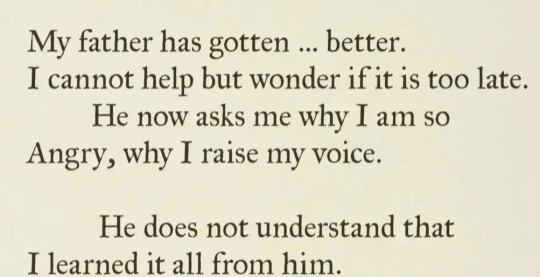







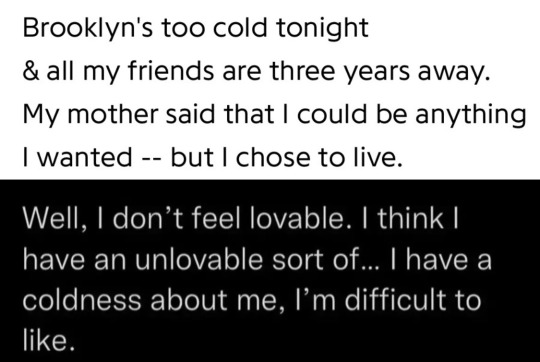

- on desperately wanting to be better but never quite reaching it (miya osamu)
Unknown | User @/stllbejeweled | Miya Osamu s4 | Chantal Akerman, from My Mother Laughs (2013) tr. Daniella Shreir | Fathers by Jose Olivarez | User @/inanotheruniverse | miya twins s4 x2 | thanksgiving 2006 by ocean vuong | normal people by sally rooney | Unknown
#i couldn’t find the first and last quotes UNFORTUNATELY#the last one i found way too many different reposts all without a citation so..#maybe it doesn’t have an exact origin?#tue first i found matching sets with more quotes but yet no origin either#all i could find online abt was people reposting it so i’m unsure where it came from#if i find the authors of them then i will update!!!!#anyways.. i’m crazy abt osamu#i will give him soooo many issues#he thinks he’s a stepping stone kinda guy fr </3#the kinda person who can’t hug his brother without hitting him first bc what if all his love is violence#how do you love someone when your hands are coated in blood and your father made them that way#what do you do when he’s gone and your hands are still bloody#feel insane abt him#will be doing an actual miya twins one too and probably a sunaosa one bc i can’t stop myself#miya osamu#miya twins#web weaving#hq#haikyuu!!#haikyuu#osamu miya#no lookey
44 notes
·
View notes
Text
I have a theory guys


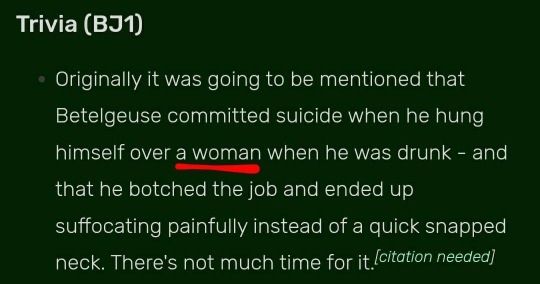
The woman that he died over is the wife in the sequel, and also the owner of the finger with a wedding ring he pulled out of his pocket, so I guess that makes her his ex wife so I could be wrong but maybe they just didn't add ex when they revealed casting for whatever reason.
#I CAN'T BELEIVE THERE'S NO CITATION FOR IT#I can't find a source for this information no matter how hard I look#Everything cites the wiki as its source but the wiki doesn't cite anything else#I read the whole early draft movie script and I don't remember seeing it mentioned#Maybe it was said during an interview or something I don't know#If anyone does know where the wiki got that information from pls tell me#:3#beetlejuice#beetlejuice 1988#beetlejuice 2#I haven't actually looked into the plot of the movie so I may be completely wrong Idk#I've been ignoring its existence for months now#Hoping that by doing so it'll stop existing but that hasn't worked#And now I'm in peak moviejuice brainrot and I'm... EXCITED FOR IT..... ewwwww I can't believe this
12 notes
·
View notes
Text
presenting the topic of my ap bio final paper: the curious case of one kenny mccormick
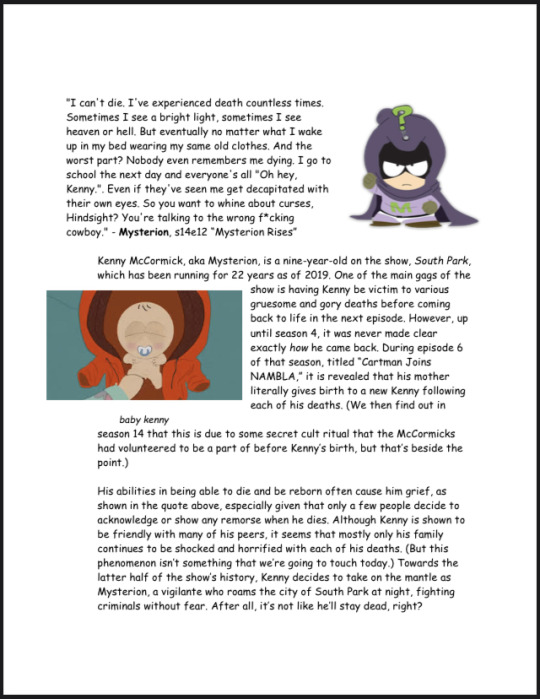

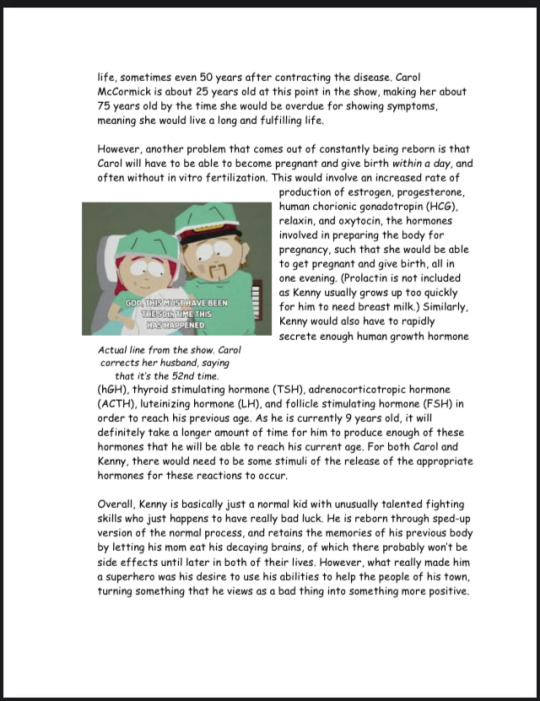
readable text and poorly done citations under the cut
"I can't die. I've experienced death countless times. Sometimes I see a bright light, sometimes I see heaven or hell. But eventually no matter what I wake up in my bed wearing my same old clothes. And the worst part? Nobody even remembers me dying. I go to school the next day and everyone's all "Oh hey, Kenny.". Even if they've seen me get decapitated with their own eyes. So you want to whine about curses, Hindsight? You're talking to the wrong f*cking cowboy." - Mysterion, s14e12 “Mysterion Rises”

Kenny McCormick, aka Mysterion, is a nine-year-old on the show, South Park, which has been running for 22 years as of 2019. One of the main gags of the show is having Kenny be victim to various gruesome and gory deaths before coming back to life in the next episode. However, up until season 4, it was never made clear exactly how he came back. During episode 6 of that season, titled “Cartman Joins NAMBLA,” it is revealed that his mother literally gives birth to a new Kenny following each of his deaths. (We then find out in season 14 that this is due to some secret cult ritual that the McCormicks had volunteered to be a part of before Kenny’s birth, but that’s beside the point.)

His abilities in being able to die and be reborn often cause him grief, as shown in the quote above, especially given that only a few people decide to acknowledge or show any remorse when he dies. Although Kenny is shown to be friendly with many of his peers, it seems that mostly only his family continues to be shocked and horrified with each of his deaths. (But this phenomenon isn’t something that we’re going to touch today.) Towards the latter half of the show’s history, Kenny decides to take on the mantle as Mysterion, a vigilante who roams the city of South Park at night, fighting criminals without fear. After all, it’s not like he’ll stay dead, right?
One of the biggest biological mysteries regarding Kenny’s rebirths is his ability to retain his memories, even within a brand-new body. It is often believed that one’s memories are contained within their RNA, and with brand-new RNA each time, it shouldn’t be possible that he would be able to have all of his memories back. However, with the idea of viable “memory transfers,” it is.
The memory transfer theory is that transferring RNA from one organism that has been “trained” to react in a certain way, to another organism (called the “naive” organism, where it hasn’t been “trained”) will cause the naive organism to have those learned reactions to certain stimuli. The idea is that, if we could figure out some way to inject RNA from Kenny’s dead body into his new body, then we could transfer the memories from his old body into his new one, as the memory transfer theory states. This is based off of McConnell’s experiment in March 1960, where they were able to successfully implant learned reactions from one planarian to a naive one. This was done by using the cannibalistic tendencies of a specific species of planarian, such that the naive planarians reacted to stimuli in the way that the trained planarians were conditioned to react.

Scientists have also begun to experiment with snails.
This implies that in order for Kenny to be able to retain his memories after being reborn, he would need to somehow consume brain matter (where RNA is made) from his former corpse -- something that would be pretty difficult for a newborn to do. As such, it is probable that his mother would have to consume Kenny’s brain for him, which comes with an entire other set of problems that have to do with the kuru disease (often likened to “mad cow” disease) due to the prions that she would be ingesting and putting into both herself and Kenny’s unborn self. However, the symptoms of kuru often don’t show up until later in life, sometimes even 50 years after contracting the disease. Carol McCormick is about 25 years old at this point in the show, making her about 75 years old by the time she would be overdue for showing symptoms, meaning she would live a long and fulfilling life.

However, another problem that comes out of constantly being reborn is that Carol will have to be able to become pregnant and give birth within a day, and often without in vitro fertilization. This would involve an increased rate of production of estrogen, progesterone, human chorionic gonadotropin (HCG), relaxin, and oxytocin, the hormones involved in preparing the body for pregnancy, such that she would be able to get pregnant and give birth, all in one evening. (Prolactin is not included as Kenny usually grows up too quickly for him to need breast milk.) Similarly, Kenny would also have to rapidly secrete enough human growth hormone (hGH), thyroid stimulating hormone (TSH), adrenocorticotropic hormone (ACTH), luteinizing hormone (LH), and follicle stimulating hormone (FSH) in order to reach his previous age. As he is currently 9 years old, it will definitely take a longer amount of time for him to produce enough of these hormones that he will be able to reach his current age. For both Carol and Kenny, there would need to be some stimuli of the release of the appropriate hormones for these reactions to occur.

Actual line from the show. Carol corrects her husband, saying that it’s the 52nd time.
Overall, Kenny is basically just a normal kid with unusually talented fighting skills who just happens to have really bad luck. He is reborn through sped-up version of the normal process, and retains the memories of his previous body by letting his mom eat his decaying brains, of which there probably won’t be side effects until later in both of their lives. However, what really made him a superhero was his desire to use his abilities to help the people of his town, turning something that he views as a bad thing into something more positive.
citations:

(tumblr wouldn’t let me actually paste the links 😐)
#kenny mccormick#carol mccormick#stuart mccormick#mysterion#south park#south park theory#apparently there was also a diagram of a brain and body that i drew and pasted onto my project but idk where it is#if i find it i’ll add an addendum#we’d had a couple different choices for our final project and i narrowed what i wanted to do down to#a paper finding a biological explanation for a superhero’s powers (mysterion) and a research paper on whatever research technology#(i would’ve liked to do my paper on deep brain stimulation but nooooo ms t thought it would be boring 😒)#i pulled so much shit out of my ass for this paper it almost makes me embarrassed#ALSO WHY DID I DO MY CITATIONS LIKE THIS???? NOT EVEN APA??? MLA????? NOTHING????#this is a fucked up theory tho right???#just realized that i said that carol is 25 in the show 🙄
107 notes
·
View notes
Text
we all know historical james fitzjames loved to include silly little doodles in his letters but i am actually charmed beyond measure against my will that lady franklin apparently copied one of them when she transcribed a letter of his???
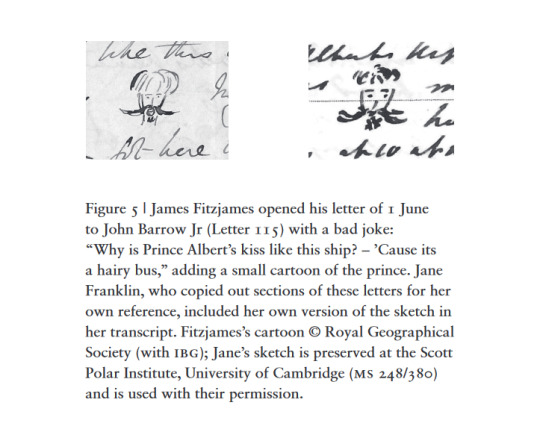
source: MAY WE BE SPARED TO MEET ON EARTH. Letters of the Lost Franklin Arctic Expedition (Edited by Russell A. Potter, Regina Koellner, Peter Carney, & Mary Williamson) McGill-Queen’s University Press 2022
#james fitzjames#jane franklin#the franklin expedition#also i love it when editors get a bit mean... 'a bad joke'... where's ur childlike whimsy!!! it's always morally correct to joke abt royals#cavetext#ive seen his og doodle on here before but i havent come across her copy so if someone already made this post im sorry#i just wanted to show it to u guys bc i enjoyed looking at it#what in hell is that citation style u may ask. dont worry about it
9 notes
·
View notes
